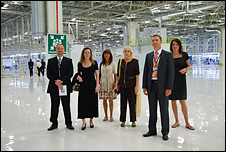à propos: conception of time. German business people hardly have time to waste and would like to see negotiations reach a succuessful conclusion quite quickly. But their Indian partners appreciate personal contacts and conversations as a kind of "confidence building measures". In India the way to business leads through personal interaction. More time and effort is required hear for smalltalk and cocktail parties.
à propos: working culture. German managers are used to delegate responsibilities and expect their employees to think independently. But Indian workers hardly ever look beyond their own sphere of work and shy away from taking decisions on their own. For most of them it is sufficient to obey orders and finish their task. That is because traditionally the caste system allots a precisely defined job to every individual.
à propos: precision. Most Germans aspire to carry out their work thoroughly and as well as possible. For most Indians precision does not play a vital role, as long as it works. "Chalta hai – it works" is an often-heard idiom here. Under there circumstances flexibilty is more important than perfection. Rigid insistance on precision and punctuality is mostly regarded as excessive and rigorous, even inhuman. India's culture definately recognises people as imperfect. Even the gods fall prey to "human weakness".











